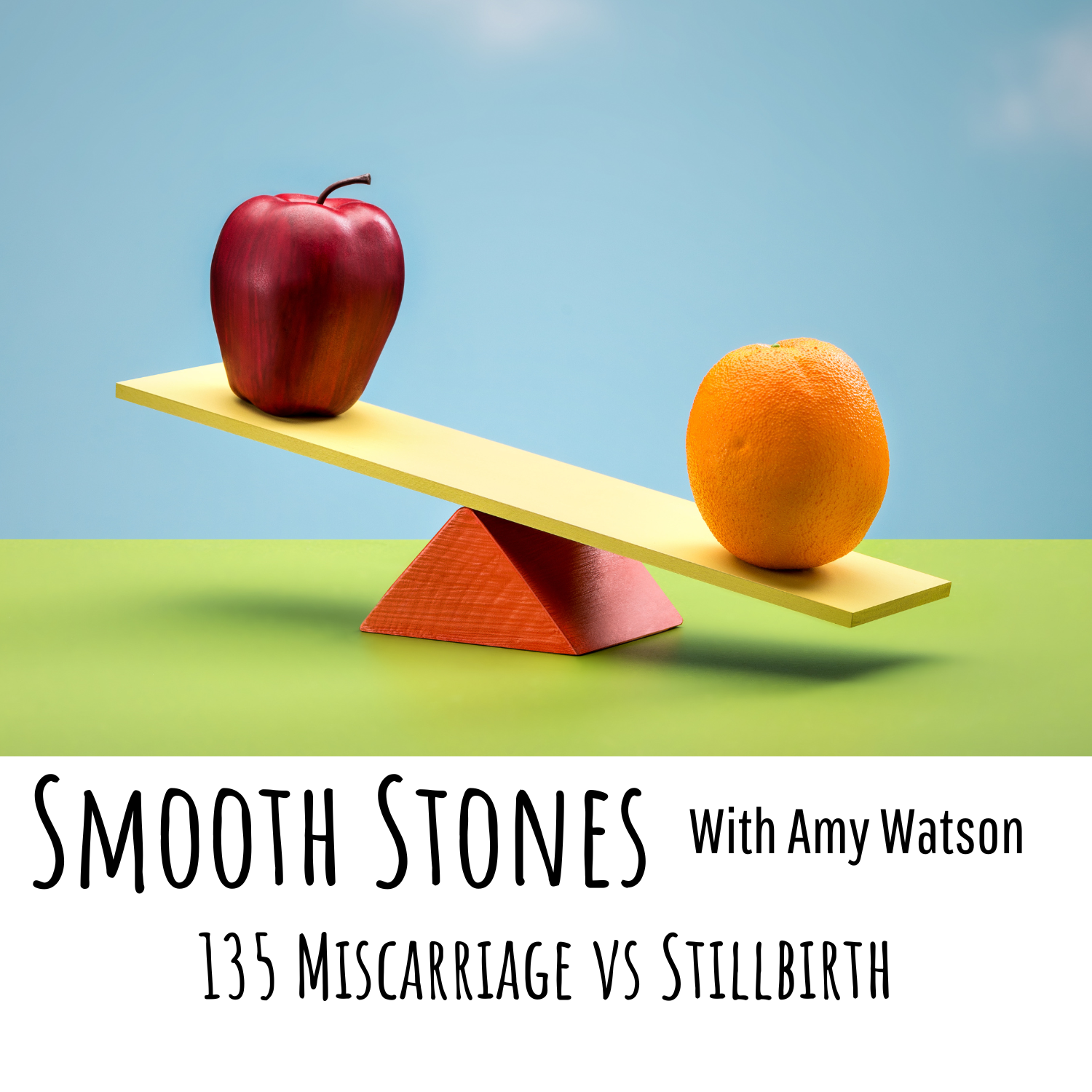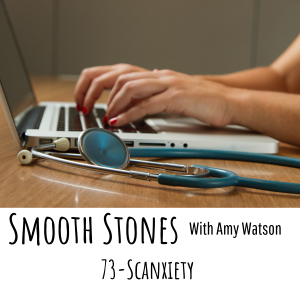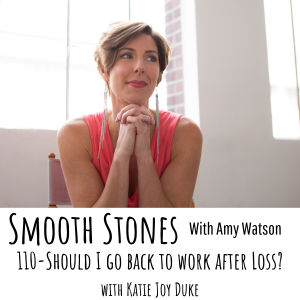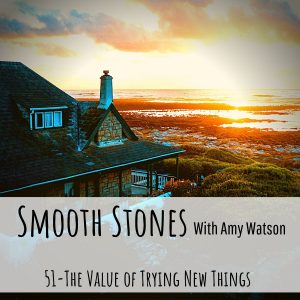We sometimes can’t help comparing our experiences with others, or even with our own. Society tells us that a miscarriage is less painful than a later loss, is that true? As someone who has lost two babies in different ways, I’m sharing my own stories and the things I hear from clients to help you understand how you actually CAN compare losses in a compassionate way. You don’t want to miss this episode.
Interested in being a Beta tester for my new programs at a discounted rate? Come to a connection call.
To schedule a free connection call, click HERE
Follow me on Instagram! @amy.smoothstonescoaching
Visit my website.
Photo by Canva
Music by ZingDog on Pond5
Transcription
All right. I got a little behind the scenes podcast news for you. You might be wondering what this episode is gonna be about based on the title. Uh, you might be wondering if this one is for you, ex if you experience a different kind of loss besides miscarriage or stillbirth.
First of all, I wanna say yes, it’s for you. Please stay with me. Second, what we’re really talking about today is comparing losses. So why did I name this miscarriage versus stillbirth? Well, something funny happens with the podcast algorithm and sometimes Smooth stones doesn’t show up when someone searches for miscarriage or stillbirth in their app.
I actually do this from time to time. I Google myself, I look up resources. I go in Apple Podcasts, which is what I use. And I just type in miscarriage and I see what comes up because I want people to be able to find this podcast. So I decided to put the words miscarriage and stillbirth both in an episode title, and I hope it helps more people find the podcast, but what is way more effective than putting in the right search terms, which is important.
But what really, really helps is if you share this podcast with your loss, mom and dad, friends. Most of the podcasts I love have been recommended to me by people that I trust. So please share and if you haven’t written a review yet, will you please. This also helps the algorithm show smooth stones to more people who need it.
I c I cannot claim to understand podcasts, algorithms, um, but I am just doing everything I can. I hope this sounds sincere from the bottom of my heart, I just wanna help as many lost families, grieving families, um, as I can, and I’m gonna do all the things I need to to make that happen. But like I said, the most effective is when you share and tell people what you’ve learned and what you love, and how much it’s helped you.
So please, um, if you would do that, I would love it. And if you love it, you know, make sure you. Let me know. I love, every once in a while I’ll get a DM where someone just tells me how much they enjoy the podcast and it’s, it’s the best. Honestly, I love it so much because when I’m podcasting alone in my office, I think of you.
But it’s so nice to get to hear back from you, so please always feel like you can reach out. Thank you for being here. Let’s talk about today’s topic. Why is comparing losses so common? It seems like we almost can’t help doing it. We do it to ourselves and we know that other people do it. They do it to us.
So why is there this push to rank our paying or put it in some kind of chart? Comparing is actually a normal part of human behavior. We compare ourselves to our past self, to others around us, to people our same age. Like what are the people in our graduating class doing now? Uh, we compare our knowledge, our abilities, with people in the same field as us.
Like if you’re at work or if you’re an entrepreneur. Uh, we also compare with other lost parents and. I sometimes call this the grief Olympics. As I was researching for this episode, I found a website that said possibly up to 10% of our thoughts are comparisons, and I’m going to guess, so this is like an educated guess based on everything I’ve seen that that number goes up when we are grieving, because what I hear a lot of is my clients comparing themselves to people who aren’t grieving to.
Different losses to their pregnant, happy, blissful friends, and even to society as a whole. We’re trying to find our bearings in grief, and I see this happen so much where we just want to find out where we fit. But for most people, it just causes a whole lot of pain, especially when you compare yourself now with yourself before.
This is so common and it’s very difficult to navigate alone. Looking forward and seeing your life as less than in the future is also another way. I see comparison show up now. The pros of comparison can be that we look to up level ourselves. My kids are. In track this year, and the goal is always to beat your own personal best.
Then if there’s someone faster than you, it also pushes you to go harder. I remember in elementary school, uh, we would do these fitness tests and we could always run faster if we raced the quickest kid in class rather than just running on, on our own towards the finish line, against the stopwatch. Um, I bet you all I could still remember and see this kid and we’d always be like, race us.
And he would, he would do it. But I think we all had one of those in our class. Uh, comparison also gives us a baseline. So in grief, that can be comforting if you feel like you might be having really abnormal thoughts and feelings or that you’re not doing very well after the death of your baby because no one around you is dealing with this.
You can join a support group and all of a sudden you realize you’re right where you’re supposed to be. You’re able to get a baseline of what life after loss could look like. Right? And so this is where this term. Normal. Like we all it, our human brain wants to fit in. We want to know that we’re normal. So we’re always just doing these comparisons and it’s not all bad.
If you find yourself comparing, it’s okay. Just notice if you are using comparison for good or for evil. If you are being kind to yourself and others or kind of mean. But let’s talk about comparing losses. When you talk about baby loss, I believe there is a spectrum that includes so many things. I’m gonna share a bunch here.
I just have a list that I, I know that as soon as I hit published, I’m gonna think of like a million more. Um, I know I’m gonna miss some. So if you don’t hear your particular type of loss, just know it is nonetheless, absolutely valid. So here are many. Things that I hear of that I think go on this spectrum, wanting a child and never getting pregnant.
Infertility, embryo loss, a good embryo that doesn’t stick. Miscarriage, ectopic pregnancy, chemical pregnancy, partial molar pregnancy. First trimester loss, second trimester loss, termination for medical reasons. A fatal diagnosis carrying to term adoption loss, um, health loss like such as an emergency, hysterectomy or complications during also the death of your baby.
Multiple losses. Now this is an interesting one because. I feel like sympathy goes up to a point, but then judgment comes in if you still keep trying, like I think there’s a point where people say, why do you keep doing this to yourself? Um, so that’s a really interesting one. And then, Stillbirth lost during labor sids, NICU loss, accidental death, loss of faith, loss of a miracle, infertility baby that was waited for for a decade.
Surrogate loss. I mean, the list is long, and some people might make this as. Like a graph where some pain and some loss is at the bottom. And as you go up, the pain is more in society tends to treat loss this way. Where a childless couple gets jokes about if they know how to make babies. Someone who has a miscarriage gets a bit of sympathy.
A stillbirth probably gets more, SIDS gets even more, uh, tragic. Might get more. Maybe if you had a termination for medical reasons, you might get a lot of judgment and questions with less sympathy depending on your age, your situation, whether you have living kids. All of that comes into play in this complex comparison chart where society decides how much you deserve to grieve and for how long, and the thing is, As I always teach you here, like we are a product of the society and the beliefs that we are swimming in, and so this can really affect us.
So I wanna know, what have you heard from the people around you? How have they directly or indirectly put your loss on a spectrum and assigned it a pain scale? If this has happened to you, I’m so. It hurts and it’s not fair, and it may still be happening. Please acknowledge and validate your own pain.
Allow the grief of not having the support that you hoped for. Although I believe we can alleviate some of our own suffering with self-coaching, I also want you to know that you never need to downplay your pain or tell yourself you shouldn’t be hurt when the people around you compare your grief. Some common examples of this or are.
And I just pulled these outta my head. I know there’s like so many, but when you say you had a miscarriage and someone shares that their friend had a stillbirth, or you find a support group to help you with your ectopic pregnancy loss, and someone says, at least they caught it early, I lost my tube and I almost died.
Or you are mourning your baby when someone in your family shares how great grandma buried five babies and kept working on the farm through it all. But the thing about a spectrum, All the parts are there, right? This isn’t a comparison chart. This isn’t a graph. This isn’t one thing above the other. When you see a prism sitting in the sun splitting light into different colors, they all matter.
They’re all part of it. They’re all next to each other. I want you to reflect on yourself and be curious. In what ways have you judged or compared your own grief with someone else’s? How did it feel? How did you act when you were doing that, and what result did it create for you? Right? You might not have even said anything out loud.
A lot of this we do in our heads, but you still create a result. Then I want you to imagine that you didn’t need to compare at. A loss is a loss. It is that simple. None of us can really be in someone else’s shoes. We don’t know what they feel like. I choose to think that everyone has a challenge. They are currently dealing with the quote.
Everyone you meet is fighting a hard battle. You know, nothing about really helps me to give people a lot of love and grace, and it takes away comparison because it puts us all in the same. And I call that boat being a human. I even think about, I know a lot of people say they hate it. If someone does make a comparison, like you say, my baby died and someone says, Hey, my dog died.
It can be easy to be upset about that, but it’s like, what if that’s a big deal for them? What if they’re trying to connect with you, right? When we have this thought that, oh, they’re downplaying my grief, or they’re comparing my baby to their dog. That’s really painful, and that is something you don’t have to do to yourself, like you’re just hurting yourself when you do that.
So I, I want you to just open up to this, especially if you’ve had this happen in your life or you have people in your life or you’re in spaces where you know, you feel a lot of comparison. Just understand everyone’s fighting hard, everyone’s doing their best. We wanna connect with people, right? That’s the goal.
We want people to understand our pain. We wanna understand their pain. Um, and so when we’re all just in this boat of being a human and we’re all doing our best, I think it’s so, so powerful. And I have to add too. If you’ve had multiple losses in your life, it could be multiple babies or like other things, like a lot of times when it rains it pours.
So like when I lost River, we also had like this massive, um, real estate nightmare and then I also almost died. So it’s like there’s a lot going on and sometimes we say, you know, we’ll compare to our own challenges. Please don’t use comparison to judge yourself or how you are doing. It’s not useful, necessary, or kind.
When I talk about having a full term stillbirth and a mis miscarriage with d and c, including the hemorrhage, like I was just saying, I have to just say they are different. It’s apples and oranges. Both fruit, but not the same one wasn’t easier or harder, or more painful, or less painful. It was just not the same.
Even though they have a lot of similarities. There were also so many factors that went into these experiences. There was my reaction, my support system, my physical. My mindset, uh, the resources I had, and just like so many things, again, it’s like there’s no way this can be a hierarchy because there, there’s just so many factors going into each specific circumstance.
I can’t compare my losses to yours or to my clients when I coach you. That’s what’s most important is that you learn to validate your own loss and your own motherhood. I am never gonna compare your loss. I am never gonna downplay your loss. It’s just like not, that’s not okay with me, right? Like you get to own your experience.
I can’t tell you what it’s like watching a client realize that they get to stop downplaying their pain, but also that they get to stop downplaying their love for their child. And this is what we do when we compare, right? Like, who am I to own this grief, to own this child, to really parent them the way I want to?
If feel was only six weeks, but you can, and it’s so freeing. Helping you to stop comparing and being jealous or mad or so frustrated with people who just don’t get it is the absolute best. The other people around you, they don’t need to get it. And you don’t need to compare yourself with others when you can take care of your own emotions, your own thoughts, and you can handle the percent of your brain that wants to compare losses.
It’s the best thing ever. So what does that look like? It means you choose on purpose to cheer for all your peers. There’s no competition. We do not enter the grief Olympics. When we see someone sharing their heart and their story. We honor it, we believe it, and we give it a like. We don’t need to point out discrepancies in their story or compare it to ours.
We just listen and hold space. As Ramdas said, we’re all just walking each other home. Instead of pitting yourself against other people, walk side by side with them holding hands. Going down the road and helping each other over the bumps. If you’re finding it hard not to compare your loss or your life with others, or you’re downplaying your pain, please go to the show notes and sign up for a connection call.
I’ve got some new exciting programs coming out soon. I can’t tell you the details yet, but like we’re so close, I’m even offering some beta testing pricing. If you’re ready to finally free yourself from this pain and find yourself again. I’ve got you. This really is a skill that you can learn to stop comparing, to stop competing, and to just support everyone around you no matter what.
It is so awesome, and I want you to feel awesome. I’ll see you next time. Are you tired of feeling like your baby’s death was somehow your fault? Go to Stones coaching com and get my free mini course. How to Stop Blaming Yourself After Loss.




